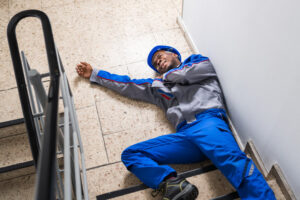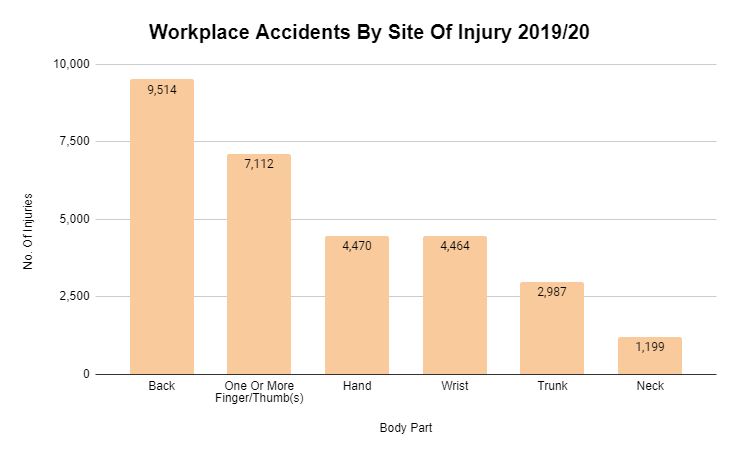Welcome to our guide on what circumstances can lead to slip, trip and fall claims. A slip, trip or fall accident could happen in a range of different circumstances and could cause a number of different accidents. While some of these accidents can be relatively minor, others can be serious or even life-changing.

Slip, trip and fall claims guide
In order for you to claim compensation, your accident must have come about because of a breach of duty of care. We’ll take a closer look at some of the scenarios in which you’re owed a duty of care later on in this guide.
To learn more about claiming after a slip, trip or fall, please continue reading this guide. Alternatively, you could contact us by using one of the following methods for free legal advice:
- Telephone 0151 375 9916;
- Fill in our contact form;
- Or message us on our 24/7 Live Chat service.
Choose A Section
- What Is A Slip, Trip and Fall Accident?
- What Are The Causes Of Slips, Trips and Falls?
- Proving Slip, Trip and Fall Claims
- Compensation Awards In Slip, Trip and Fall Claims
- Make A No Win No Fee Personal Injury Claim
- Learn More About Slip, Trip and Fall Claims
What Is A Slip, Trip and Fall Accident?
A slip, trip or fall accident could occur in a number of different scenarios and cause a wide range of different injuries. However, not every slip or fall that causes you to be injured will be the basis for a valid claim.
In order to claim, you need to have been injured because of third-party negligence. This means that you need to have been owed a duty of care that was breached, leading to your injury.
While you’re at work, you’re owed a duty of care by your employer. This is outlined in the Health and Safety at Work etc. Act 1974. Part of their duty of care means that they have to take all reasonably practicable steps to ensure your safety while at work.
While in public, you’re owed a duty of care as per the Occupiers’ Liability Act 1957. This means that the person in control of the space (the “occupier”) needs to have maintained the space so that it’s safe to be used for the intended purpose.
If you’d like someone to assess your claim’s validity, why not speak to a member of our team today? You could be offered a No Win No Fee agreement for a solicitor to work on your claim.
What Are The Causes Of Slips, Trips and Falls?
There are a number of different things that could cause slips, trips and falls to occur. For example:
- Poor housekeeping. This might include wires trailing across walkways or boxes being left out to obstruct entrances and exits
- Inappropriate cleaning products used. It’s important to ensure that the right cleaning products are used on floors. If the wrong product is used, this could lead to the floor being excessively slippery.
- A wet floor that isn’t signposted. There are a number of reasons that a floor could be wet, and not all of these can be avoided. However, this should be signposted and cleaned up as soon as is reasonable.
- Inappropriate footwear. When you’re in work, your employer has a duty of care to provide you with Personal Protective Equipment (PPE). This could include non-slip shoes.
These aren’t all of the potential causes of slips, trips and falls. There are other ways that a slip or fall could occur as a result of someone else’s negligence.
If you’d like to know more about slip, trip and fall claims, simply get in touch with an advisor from our team. They’ll be able to value your claim, and could connect you with a No Win No Fee solicitor from our panel.
Slip, Trip and Fall Statistics
The HSE provides statistics on workplace accidents resulting in injuries. It also includes information on the types of injuries that people suffer and to where.
We have the graph below that displays some of the most recent statistics. These cover some commonly injured parts of the body in workplace accidents.

Proving Slip, Trip and Fall Claims
If you’re looking to pursue a claim for injuries sustained in a slip, trip or fall, then you’ll need evidence to support your claim. This could include:
- Witness details, so a statement can be taken at a later date.
- Photographs of the scene.
- Any CCTV footage.
You should also seek medical attention for your injuries as soon as you can after the accident happens. This will ensure that you get the treatment you need for your injuries. In addition to this, the medical record generated by this visit could be used as evidence in your claim.
A solicitor would be able to offer you guidance on the kind of evidence you could use to support your claim. One of our advisors could connect you with one of our solicitors; simply get in touch today to find out more.
How Long Do You Have To Claim For A Slip, Trip and Fall Accident?
There is a set time limit for all personal injury claims, including slip, trip and fall claims. The personal injury claims time limit is generally 3 years from the accident date or from when you became aware that your injuries came about because of negligence.
However, there are some exceptions. We’ve explained these below:
- Child accident claims. If a child is injured, they cannot pursue their own claim. However, a litigation friend can claim on their behalf. While they can’t pursue their own claim, the time limit is suspended. If no claim has been made by the time they’re 18, they have 3 years to pursue their own claim.
- Lack of mental capacity. If the injured person does not have the capacity to claim, a litigation friend can represent them and the time limit is suspended. It begins again in the event that the injured person regains their mental capacity.
Compensation Awards In Slip, Trip and Fall Claims
When you claim, your compensation can be made up of two different heads of claim. These are general damages and special damages.
General damages is the part of your claim that compensates you for the pain and suffering caused by your injuries. It will depend on the severity of the injury, how long it’s affected you and whether you’ll be left with any long-term effects.
In order to value this head of your claim, you’ll be invited to a medical assessment. This is where an independent medical expert assesses your injuries and speaks with you about how you’ve been affected.
Below, we’ve included some examples of general damages. These guidelines come from the Judicial College.
| Injury | Severity | Compensation | Notes |
|---|---|---|---|
| Ankle Injury | Very Severe | £46,980 to £65,420 | For example, a transmalleolar fracture causing a permanent deformity |
| Elbow Injury (a) | N/A | £36,770 to £51,460 | Where the injury causes severe disability. |
| Wrist Injury (b) | N/A | £22,990 to £36,770 | An injury bringing about a significant permanent disability; however, there will be some useful movement. |
| Scarring | Less Severe | £16,860 to £45,440 | A substantial amount of scarring that causes a significant psychological reaction. |
| Multiple Fractures Of Facial Bones | N/A | £13,970 to £22,470 | Facial fractures causing permanent deformity |
| Foot Injury | Modest | Up to £12,900 | For example, a metatarsal fracture with a full recovery |
| Toe Injury | Moderate | Up to £9,010 | A basic fracture or exacerbation of a existing condition |
| Teeth Damage | N/A | £8,200 to £10,710 | Loss of or suffering of damage to multiple front teeth |
| Achilles Tendon | Minor | £6,820 to £11,820 | Where there has been some damage to the tendon. |
| Post-Traumatic Stress Disorder (PTSD) | Less Severe | £3,710 to £7,680 | A virtually full recovery will have been made, with only minor symptoms persisting any longer. |
Special damages is the part of your claim that compensates you for any financial impact your injuries have had on you. This could include:
- Loss of earnings
- Medical costs
- Travel costs, for example, to and from medical appointments
For more information on the costs that could be covered by slip, trip and fall claims, speak to an advisor from our team today. They’ll be able to offer you free legal advice about claiming.
Make A No Win No Fee Personal Injury Claim
No Win No Fee solicitors could help people make slip, trip and fall claims. When you make a claim with this kind of agreement, you won’t be asked to make any upfront or ongoing payments to your solicitor. They also won’t ask you to pay anything in the event that your claim is unsuccessful.
If they’re successful in winning you compensation, they’ll deduct a success fee from your settlement. There’s a legal cap on this fee, meaning that you’re sure to receive the majority of the compensation you’re awarded.
We suggest that you contact us to discuss your No Win No Fee claim. Our advisors could take care of you by assessing your case’s validity. If your claim has a good chance of success, they could connect you with one of our solicitors.
You don’t have to progress with a claim just from talking to us. Nevertheless, if you do wish to take legal action, you can:
- Call us on 0151 375 9916;
- Fill out our online form;
- Or use our 24/7 Live Chat tool.
Learn More About Slip, Trip and Fall Claims
We hope you know more about filing slips, trips and falls claims. If you still want more information, though, make sure to check out the links below for additional research.
If you had to take time off for your injuries and didn’t receive full pay, see if you could be entitled to Statutory Sick Pay (SSP).
The Royal Society for the Prevention of Accidents is a charity that aims to reduce the rate of accidental injury.
Furthermore, the NHS has a page on how to identify a broken bone.
Thank you for reading our slip, trip and fall claims guide.

